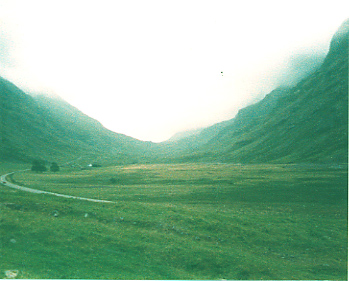



To purchase this ebook at Amazon.com Kindle Store:
"How to be More Scottish: An Insider's Guide for the Bravehearted."
Celtic Rulers
The history of the Celts leads to the inevitable question: who ruled them? Evidence suggests that the Celtic tribes were each ruled by their own warrior kings or queens, such as the fearsome warrior queen Boudicca (who died in 61AD) described by contemporary Romans, and by a caste of intellectuals known as druids. Some argue that the druids, whose sacred knowledge was never written down but passed down orally, might even have ruled over the rulers themselves! What did the Celts look like?
The Celtic warriors, kings, and queens often washed their hair in lime water and dyed themselves with blue woad to appear more terrifying in battle; they likely kept their hair long but shaved their bodies, except for their mustache. Celtic chiefs and druids wore multi-colored clothing not unlike tartan material and a fine torque which is kind of flat-plated necklace around the neck, but Roman sources tell us that Celtic men and women often went stark naked into battle but for their bristling lime-washed hair and blue-painted bodies!
The Earliest Kingdoms of Caledonia, or How Scotland Got Its Name
Now we come to the point in time just after the departure of the Roman legions, beginning around 410 AD. Rome was facing its own problems, and in fact the city and its entire Empire fell by the end of the century, but that's another story. The important thing to remember is that Rome's conquest of and departure from southern Celtdom opened Britain, inlcuding the nothern Celtdom of Caledonia, up to other invasions. England and southernmost Scotland were soon invaded by Germanic Anglo-Saxons who had been slowly trickling in for a while, and still much later by the Normans, who came in 1066, but we digress. By about 800AD in the north the Caledonians ("foresters") and other Celtic tribes had formed separate kingdoms and lived pretty much the same as they always had, independent from the south. These kingdoms included Alba, Dal Riada, Strath-Clota, and two once-dominant Pictish kingdoms in the middle and in the east of the country, one whose capital at Scone, in Perth, became a traditional site of the crowning of Scottish Kings. One of these kings was the famous Coel Hen, Old King Cole. Alba and Dal Riada were on the western seaboard of Argyll, and Lothian was on the east coast, encompassing the present capital of Edinburgh (later to come under Danish rule for a time). The borders of Strath-clota changed several times in years of war.
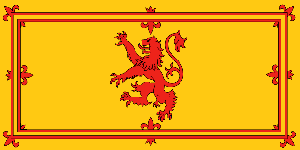
The Scots??
However, the people of Caledonia were not known as Scots then! The "Scotti" were in fact a group of Irishmen, also Goidelic Celts, but new to Scotland. The Scotti had come from the kingdom of Dal Riada in Antrim, Ireland and made another "Dal Riada" in Argyll, Scotland when they arrived in about 503 AD. Scotland later became a unified kingdom of native Picts and these close relations, the incoming Irish Celts, under Coinneach, or Kenneth, Mac Alpin, the King of Alba who had claim to the throne through his mother's lineage and united the other kingdoms into one country.
Alba, or Scotland
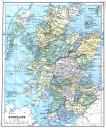
Though Alba was an ancient kingdom, Scotland is still called Alba by Gaelic speakers today. Under the new Kings, Alba conquered northern Northumbria (which are the origins of the Angles or Anglo-Saxons in the Borders). In the next few centuries after Kenneth Mac Alpin, Viking raiders established colonies to the north of Gaelic-speaking Alba and on the Western Isles. In 1266, these Viking lands and settlements finally became a part of the great nation of Alba, which once encompassed regions as far south as Celtic Cumbria in modern-day England. However, some northern Scots today are almost as much Viking as they are Scottish!
Just before Braveheart
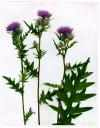
The united kingdom of Scotland, as it came to be known, began to suffer from English advances both culturally and militarily for several centuries, beginning around 1072. The King of Scotland, Malcolm Canmore, a good warrior-king and realist who would not fight a fruitless battle, married Margaret Atheling, sister of the last Anglo-Saxon king of England, Edmund. She was responsible for a lot of the Anglicization that took place during his rule. She was also the driving force in converting Scotland from the old Celtic church to the Roman Catholic one. Malcolm rather shrewdly paid homage to England's (recently France's) William the Conqueror. Think of Ivanhoe, and remember that in 1066, the Normans had just taken over England from the Saxons.
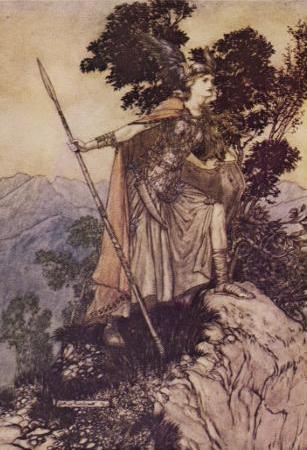
As a result of Malcolm's political strategy, French-speaking Anglo-Norman nobles came to Scotland, lured perhaps by lands to join the Scottish side against their enemies. Malcolm's son King David gave away great tracts of Scottish land to Norman nobles, although he did also make some Highland chiefs into nobles. David, who had been raised in England, created the royal burghs, or towns of merchants and artisans, in order to increase trade with England. As a result, Inglis, later called Scots, developed from the speech of the Angles in Lothian and became the language used by the traders. Anglo-Saxon and Norman French entered the language. Thus Inglis, later called Scots, developed from the same mix of languages that created English. Inglis or Scots began to spread, and Gaelic began to disappear.
However, the Highlands kept the way of the clan, even though some in the Orkneys and the Hebrides were distantly ruled by Norway. There was peace with England for a while, until a big problem developed in the late 1200's. The Scottish King died in a fall off his horse, leaving only a Norweigan granddaughter Margaret as heir, who died in the voyage to Scotland. Meanwhile, Edward I of England had already decided he wanted Scotland and had hoped to marry his son to the "Maid of Norway"--Margaret, to get it. When she died leaving Scotland without a royal heir, thirteen Scottish nobles claimed rights to the throne, though they were actually of Anglo-Norman descent and owned lands in England as well. Edward chose the puppet-king John Balliol; the rest of Scotland sided with France; Edward attacked the Scottish city of Berwick, Balliol went into exile, and Edward stole the Stone of Scone, the Stone of Destiny upon which all Scottish Kings had been crowned since King Kenneth MacAlpin founded the united country. Scotland was almost defeated. And then came William Wallace.

Early Defenders of Scottish Independence: Who were Wallace and "The Bruce"?
The two leaders responsible for regaining Scottish freedom in 1314 were William Wallace and Robert the Bruce, who was more responsible for Scottish independence than the movie "Braveheart" gave him credit for. William Wallace was born in about 1270 and lived several years in Argyll and Ayr before he won the battle at Stirling Bridge in 1297 over the advancing English armies. The victory at Stirling Bridge gave Scotland back its pride. Wallace actually did use the old attack of forming schilltrons, or circular formations of protected spearmen, in the battle at Stirling, as depicted (more or less) in "Braveheart". Wallace, however, was rumored to have been betrayed in Tor Wood Castle (some say he was taken "near Glasgow") and was violently murdered in 1305, leaving the matter of Scottish sovereignty in the hands of Robert the Bruce. Robert the Bruce, though of Norman ancestry, was also a descendent of Kenneth MacAlpin and crowned himself king in 1306; he slowly captured English-occupied Scottish cities and castles, until finally Stirling Castle was all that remained. In 1314, the Bruce defeated Edward II of England in the decisive Battle of Bannockburn, near Stirling, and gave Scotland back its freedom.

Bruce's Declaration of Arbroath, the Scottish declaration of independence, sent to the Pope, read as follows:
As long as 100 of us remain alive, we will never in any way be forced to tolerate the rule of the English. Because we do not fight for glory, or riches, or honors, but for freedom alone, which no good man gives up except with his life.
The irony is that the Scots today hold nostalgically by this sentiment; though most will admit that iScotland is now partnered with English as The United Kingdom by the Act of Union, and that such a partnership is today in Scotland's economic best interests. However, Scotland still yearns for its independent past. In the words of modern poet Lewis Spence, in his poem "Claymore!":
My heart shall never sleep,
Nor shall my soul be free
Of shadows til our Scotland keep
Her tryst with Liberty.
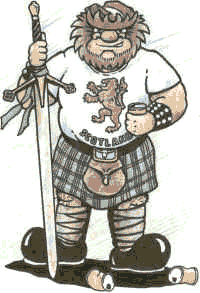
Sadly, this recapturing of complete Scottish freedom was short-lived. The fate of Scotland soon rested in the hands of squabbling, anglicized nobles who kept changing sides. Aside from the wise and just King James I and the enlightened, educated but lusty red-head James IV, who almost single-handedly reshaped Scotland's reputation in Europe as civilized people, there was a succession of mostly inept Stuart kings, some still children when they took the throne, whose enemies the Douglases were always waiting for a chance to take away the crown or to weaken its power for their own advantage.
Big Bad Henry VIII
Answering a call for aid from Scotland's French allies, good king James IV amassed an army and met the English in battle at Flodden Hill in 1513. There, after surviving cannon and arrows, the great Scots army discovered to their horror that the enemy English, under Henry VIII (James' own father-in-law!), had a new weapon, the bill-hook, which could destroy Scottish long pikes (a kind of spear) and leave the Scottish warrior open for a mortal blow. The Scots, including King James, bravely stood their ground, but they and their king were slaughtered, leaving an eighteen-month old James V to become Scotland's new king. 10,000 Scots died that day, while England lost only 1500.
Forty years later, Henry VIII, like Edward I, then sought to marry his son to the young Catholic Mary, Queen of Scots, and butchered man, woman, and child in an attack to force a marriage (that he called the "Greenwich Treaty"!), but Mary later escaped to France and married the Dauphin Francis, a French Prince. During her absence, one group of Scots did the unthinkable and sided with England: The Protestants.
Henry VIII had made himself head of a new Anglican church and left Catholicism so that he could divorce and re-marry. However, many people in Scotland and England already wanted to reform Catholicism because a lot of the priests were illiterate and untrained. These unhappy people turned to the new Protestant religion.
Under Elizabeth I, Henry VIII's daughter, Scottish and English Protestant armies took Scotland from Mary's supporters and outlawed Catholicism.
King James, Known for his Bible
But Elizabeth I of England died without an heir in 1603, and the nearest relation in line to take over was Protestant King James VI of Scotland, son of Mary, Queen of Scots, Elizabeth's own cousin, whom she had nonetheless beheaded. James wasn't stupid and agreed to become King James I of England as well. (He is remembered for the King James version of the Bible.) Unfortunately, he and the later Stuart Kings took the Scottish court away with them and became increasingly more anglicized. Scotland soon began to lose its independence through contact and commerce with England.
The Demise of Charles
Yet things seemed to be going great in Scotland until James' son Charles did a silly thing and tried to force religious changes on the Scottish Protestants' worship. They didn't like this and formed an army, then oddly joined the English Parliament--who also didn't much care for Charles--just to teach him a lesson. Once he had learned it, the Scots hoped to put him back on the throne, but the English parliamentarian army leader wouldn't hear of it.
The leader, Oliver Cromwell, instead led a civil war and got rid of the monarchy by beheading Charles. The Scots were extremely angered by this news! Cromwell had gone too far.
Scotch-Irish Americans??
Cromwell's new Commonwealth and forced occupation of Scotland lasted only eight years until he died. The rejoicing country decided to bring back its king in a so-called "Glorious revolution" because no one was killed in it. However, Charles II soon did the same thing as his father and tried to restrict the Protestants' control of their own worship. Some pretty angry Scots Protestants left for Ulster in Ireland and later went to America, becoming America's 250,000 strong Scotch-Irish prior to 1776 (actually they were Scottish, but were called Scotch-Irish population by the English colonials in America). Others were caught worshipping against the law and were sent as slaves to the Caribbean!
Then, in another bizarre twist, Charles II died childless and his brother James came to the throne, even though he was Catholic! After a while, England decided that it didn't want a Catholic King and made a law to forbid it.
William, not Wallace
Parliament got rid of James after only three short years in favor of William of Orange and his wife Mary, who were both Protestants. That was okay to the Scots at first, since Mary was James II's sister and a Stuart, even if neither she nor her husband knew nor cared anything about Scotland. The same thing went for the next Queen Anne, who was also a Stuart and a Protestant.
Fearing that the Scots would break free and establish their own Stuart King, the English Parliament orchestrated an Act of Union in 1707 in the Scottish Parliament, whose wealthier members wanted to benefit from better trade agreements. The Scottish people, who found out later, rioted and resisted, but there was nothing to be done. They'd been sold out again by their own rulers. England had at last conquered Scotland, not by force of arms, but by greed. Some of Scotland's Highlanders, who had taken no part in the union, tried to do something about it when the Queen died without an heir.
The Gaelic-speaking Scottish Highlanders didn't see why the remaining exiled Stuarts, who were in direct succession from King Charles, shouldn't get the Scottish throne. They had no wish to be ruled by England! The only thing was, the Stuart "pretender" was Catholic. But Parliament didn't want another Catholic King they couldn't control, so they decided instead to import a foreign monarch, a distantly-related, Protestant German who spoke no English and had never been to Britain and put him on the throne. He became George I of the House of Hanover.
The Jacobite Rebellion
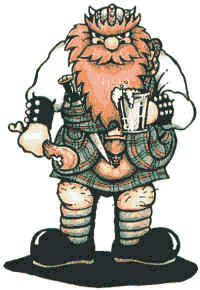
The Highlanders' movement to put their Stuart on the throne (or else keep their independence from England) from 1708 to 1719 and again in 1745 is known as "the Jacobite Rebellion". The Scottish Highlanders, who had tolerated rule from England under their own Scottish line, refused to be governed by a minor German prince and rallied around James III and later his son, Prince Charles Edward. The two of them were unfairly called "pretenders" to the throne by the English Parliament.
Under the banner of Prince Charles Edward, often called "Bonnie Prince Charlie" and the last of the native royal Scottish line of Stuarts, the Jacobite Highlanders sought freedom for Scotland and the restoration of the Stuart dynasty.
But not all of them joined the Jacobites. The clan Campbell and a few other Highland clans had become Protestant. A few of the Campbells had already massacred the Catholic MacDonalds at Glen Coe in 1692 on the orders of King William, who wanted to control the Highlands; the MacDonalds hadn't yet sworn allegiance to him and had supposedly had to be punished. Later, these Protestant clans sided with the English, fearing Catholic rule. As so often happened in Scottish history, the rift between the Catholic and Protestant faiths had created a rift between brother clans of Scots.
When the Jacobites fought the English Government and the Protestant Lowlanders and Highlanders on the fields of Culloden, it was also clan against clan.
The Decline of Scottish Independence
1745 was Bliadna Thearlaich, Charlie's year, the last stand. Bonnie Prince Charlie and his Jacobite army won several battles. However, the Jacobites were defeated at the battle of Culloden in 1746. Armed only with their claymores swords against the government troops' muskets and forsaken by their French allies, the Jacobites never had a chance. The English musketeers attacked not the men in front of them but those to their right, who were made vulnerable as they raised their swords, and butchered them. With the Jacobite defeat, the old Highland way of life died out. With cruel efficiency, the victorious government enacted the Act of Proscription in 1747 which forbid the wearing of tartan, speaking of Gaelic, and playing of bagpipes, along with the ancient Highland ways and traditions which dated to the early Celts.
After the defeat at the field of Culloden and subsequent massacre of over a thousand wounded Highlanders, Bonnie Prince Charlie fled into exile with the help of Flora Mac Donald, journeying "over the sea to Skye" and then to France; he died years later and was buried in Rome. His Highlanders were conscripted into the British armies and returned in small numbers to find that their clans had been "cleared out" in the Highland clearances. The Highlands became almost empty, as they are today.
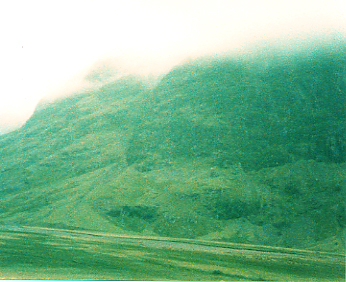
The Enlightenment
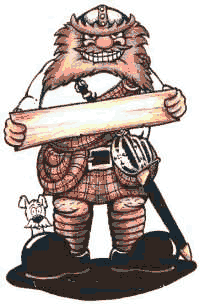
Scots was the language of the Scottish enlightenment, which began in 1720, though John Knox had begun to establish universal education--an unknown concept in the world--in Scotland as far back as 1560. By the 1700s, almost everyone in the Lowlands could read and write, and Scotland had had universities since the 1400s. The Scottish reputation for academic excellence is many centuries old, as Louis B. White said of the Scots in Colonial America:
If they did not literally believe that Latin and Greek would provide the pass words into heaven, Scotch schoolmasters and ministers managed to convey the suspicion that St. Peter would be more impressed by a learned man than a barbarian.
When the Scots learned about new farming methods, most of the farmers were freed to join highly skilled, new industries, such as textiles and shipbuilding. In many ways, Scotland spearheaded the industrial revolution, and its rich coal reserves and iron industry, railways, and shipbuilding industry soon made Scotland prosperous as it had never been before; Scottish engineering and inventiveness became renowned worldwide, as it remains today (see the chapter: Proud to be Scottish).
Gaelic Retreat
As a result of the emergence of Scots, Scottish Gaelic, once the language of all Scotland and northern England, began to disappear in the Lowland areas, even though many Highlanders have moved to the Lowlands. By the fifteenth century the Gaelic tongue had been banished to the Highlands and outlying islands. Today, fewer than one hundred thousand people speak Scots Gaelic, including a percentage of Glaswegians (though Gaelic is not their daily tongue; they usually speak English) and the Scots descendants in Nova Scotia, Canada, where Gaelic is still spoken by a few.
Perhaps Gaelic will go the way of Manx, the Celtic language of the Isle of Man, which died out completely in the last 100 years.
***chapters omitted***


Chapter Seven: Proud to be Scottish
Scots are a very proud group of people, and have made several contributions to world culture despite the relatively small population of the country. The tourist might find knowing a bit about the Scottish character extremely useful in dealing with Scots in business and in everyday matters. Among other things, the Scots invented:
1. logarithms--John Napier
2. the modern steam engine--James Watt
3. the raincoat, or "mac" in Scotland--Charles MacIntosh
4. (founded) the United States Navy--John Paul Jones, a Scot, was known as the "Father of the US Navy"
5. marmalade--Mrs. Keiller
6. adhesive stamps--John Chalmers
7. the telephone--Alexander Graham Bell
8. the bicycle--Kirkpatrick MacMillan
9. ( discovered ) penicillin--Sir Alexander Fleming
10. ( founded ) the Bank of England--William Paterson
11. pneumatic tyres, or "tires" in the US--John Boyd Dunlop
12. chloroform--Sir James Young Simpson
13. tarmac, from "tar Macadam"--John Macadam
14. the television--John Logie Baird
Scotland and the Industrial Revolution
Many famous philosphers, scientists, doctors, writers, painters, and inventors of the Industrial Revolution, often called English or British, were actually Scottish:
1. scientist James Prescott Joule
2. physicist James Maxwell, whom Einstein called the greatest physicist since Newton and revolutionized ideas about electro-magnetism
3. philosopher John Stuart-Mill
4. Joseph Black, chemist and physicist who discovered carbon dioxide
5. capitalist professor and philosopher Adam Smith, who created the science of economics as we know it and influenced Karl Marx
6. philosopher David Hume
7. Alexander Nasmyth, painter
8. William Kelvin, physicist
9. Henry Bell, inventor of first steamboat, who later helped out American engineer Fulton
10. Thomas Telford, engineer famous for roads and bridges
11. Robert Adam, renowned architect
12. Robert Stevenson, engineer, grandfather ot the author of the same name
13. Charles Rennie Mackintosh, world-famous artistic architect
14. Daniel Rutherford, scientist who discovered nitrogen
This is of course only a small list of the great Scottish contributions to engineering, art, science, and philosophy.

"Tristan and Isolde" painting by John Duncan now at Edinburgh
Why so many Scots inventors?
These Scottish inventions came about because Scotland has long enjoyed a tradition of fine, free public education for all emphasizing math, philosophy, and science. This has been the case for centuries, while English schools were reserved only for the aristocracy and focused on teaching Greek and Latin.
Though they are extremely proud of the valor of their battle-riddled history, Scottish people rightfully resent the inappropriate prejudices painted by their English conquerors who have long held them to be barbaric and even racially inferior. A lingering prejudice toward the Scots survives today in England, who regard their northern neighbours as provincial and backward. Moreover, this English myth has been propagated worldwide, and Scotland has come to be regarded as a wild land of the poor, uneducated, and frugal.
In truth, the average Scot is well-versed in poetry and tradition, science and nature, and is far less reserved than his southern countrymen; he is warm, gracious, and so hospitable that he would heartily offer a stranger his last crumb. Lastly, he is deeply loyal to both land and fellows. If this philosophy renders the Scot "backward", then one should be proud to be called so.
Here are Some More Famous Scots and Scottish Descendants in America
Scots:
William Robertson, whose ideas founded the American educational system
John Witherspoon and James Wilson, signers of the Declaration of Independence
John Paul Jones, father of the US navy
Patrick Henry, patriot who said "Give me liberty or give me death!"
William Lewis and Meriweather Clark, frontier explorers to the West in 1806
Andrew Carnegie, industrialist and philanthropist
Alexander Graham Bell, inventor of the telephone
Descendants:
John Hancock, Thomas McKean, James Smith, George Taylor, Matthew Thornton-- signers of the Declaration of Independence
Nine of the first governers of the thirteen states in 1776
Alexander Hamilton, Secretary of the Treasury
President James Monroe
President Andrew Jackson
Samuel Houston, founder of Houston, Texas
Davy Crockett, frontiersman
Kit Carson, famous trapper, guide, and soldier
President James Knox Polk
President James Buchanan
General Ulysses S. Grant, later US President Grant
Confederate General Jeb Stuart
Confederate General Stonewall Jackson
General George Brinton McClellan
President Andrew Johnson
John Muir, who persuaded Roosevelt to establish America's national parks, including Yosemite
President Chester A. Arthur
President William McKinley
Herman Melville, author (Moby Dick)
James Gamble, of Proctor and Gamble company
President Woodrow Wilson
Washington Irving, author ("The Legend of Sleepy Hollow")
Edgar Allan Poe, poet
Henry James, author
President Lyndon Baines Johnson
US Representative to the UN, Adlai Stevenson
James McDonnell, aerospace pioneer and aircraft supplier during WWII
Senator George McGovern
General Douglas MacArthur
J. Willard Marriott, hotel founder
Astronaut Neil Armstrong
Leon Leanwood Bean, outdoor wear clothing manufacturer
Malcolm S. Forbes, publisher of Forbes magazine
Elvis Aaron Presley, rock musician
John Wayne (born Marion Michael Morrison), actor
William Denby Hanna, cartoonist
Oh Flower of Scotland

Scotland is a land of great literary tradition, beginning with Old Scots and the "Golden Age" of James IV. In the Industrial age, we find Robert Burns, Sir Walter Scott, author of Waverly and Ivanhoe, Robert Louis Stevenson, whose works include Treasure Island and The Strange Case of Dr. Jekyll and Mr. Hyde, Sir Arthur Conan Doyle, creator of the famous character "Sherlock Holmes", and Mary Shelley, author of Frankenstein, to begin with but a few. These adventurous stories became popular in the late Victorian era, influencing generations of writers and readers worldwide ever since. Also famous is renowned Scottish dramatist Sir James Matthew Barrie, author of Peter Pan.
Scots also share a love of song and poetry with other Celtic nations, ancient songs perhaps being the source of the poetic tradition. (If we digress into sentimentality here, please forgive us.) Since Burns, many Scots poets aside from McDiarmid have kept the tradition alive, using their love of country as an endless source for stirring ballads. You may even begin to notice a trend in them, as Scots who have wandered abroad dream of returning home. For example, here is an excerpt from "Love's Last Request", a poem by John MacGregor, once Bard of the Clan Gregor, shortly after the Act banning the name of MacGregor was repealed:

On it (my grave) spread no flimsy roses,
Fresh and fragrant though they bloom,
Since they're no' the tribal emblems
That should grace my Highland tomb:
Place instead some purple heather,
Plant a sprig of stately pine,
For they're both supremely loyal,
And, by birthright, both are mine!
Chapter Twelve: Scots as Commonly Spoken in the Central Belt: Five Sample Dialogues and Speech, with short Dialog introduction
Dialogue introduction:
Harry
Hallo, Caroline! I haven’y seen ye fer a while.
Caroline
Oh, hiya!
Harry
What’ve ye been deein?
Caroline
Och, well, I was awa?doon at my gran’s, ken, she stays in Glasgow.
Harry
I didn’y ken that.
Caroline
Oh, aye.
Harry
Well, it was nice tae see ye, hen.
Caroline
Cheerio the noo, Harry.
Harry
Cheerio.
Vocabulary:
Expressions
Hiya--hello
Aye--yes
Nay--no, not
(No--no, not)
Verbs
tae dee--to do
tuh ken--to know
tuh stay--to live (in a place)
Prepositions
awa?-away
doon--down
fay--from
Harry--familiar name for Henry; in Scotland it is almost always used instead of Henry.
Nouns
hen--a young girl (always said by someone quite a few years older, to girls and young women.)
ye--you (The English word “you?is used, but it’s more emphatic)
Adjectives/Adverbs
noo--now
In Scottish, verbs are nowadays mostly English words said in the Scottish way:
He isn’y goin?
He’s not going
…isny +gerund= is not doing something
I denny ken it
I don’t know it
(dennay) want it,
like it, mind it, etc.
I munny (mony) go
I’m going to go (have to go)
dee it -- to do it
hay it -- to have it
I’ll nay dee it
I ll not do it
hay it -- have it
I wiln’y dee it
I won’t do it
hay it -- have it
I shouldn’y dee it I shouldn’t do it
take it take it
hay it have it
In all of the above examples but one, the Scottish version is largely an English root word with a different word ending; however, “munny (mony)?is uniquely Scottish, except in certain dialects of Northern England, where they would say “mun?
B. In general, the Scottish usually speak in participial phrases, or the “ing?form of the verb. Note a few examples:
Whut’re ye havin?--(lit.) What are you having?
(Instead of “What will you have??or “What do you want??
I’m no botherin?-I don’t care (which is more emphatic) (Instead of “I won’t bother?or “It doesn’t matter?
“I’m no botherin’” is a polite way of declining interest.
What are ye decidin?--What do you want?
Are ye needin?the toilet?--Do you have to go to the bathroom?
whether yer wantin?or no?-whether you want to or not.
A Few Scots Idioms:
Ah dennay (said “dennee? ken what yer talkin?aboot--one of the most important idioms, it means “I haven’t got a clue what you’re saying?
awa’wee’yah/ awa’wi’ye?-oh, go on now! or Go away! Literally, “Away/ Off with you?lt
I’m awa?ta ma bed--I’m going to bed
bloody hell!--damn it all!
can you no?..?--can’t you...?
cheeky wee bissom (said “bizzum?--cheeky brat, only a bit more vulgar
come ben--come into the sitting room
denny mindit (“mind it?said as one word)--doesn’t bother me, don’t remember, pay attention to
denny mindit--don’t mention it, don’t worry
denny/dinny you mind--don’t worry
doesn’y/didn’y bother me--doesn’t/didn’t bother me
(with regard to a specific thing or person as agent)
fallen oot—no longer on speaking terms/friends
gie’s a brek--(lit.)give us a break/ oh, come on! Gimme a break!
*** you'se two--you two...